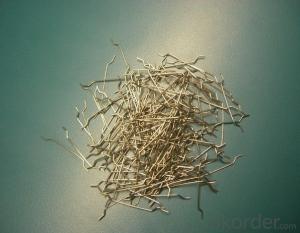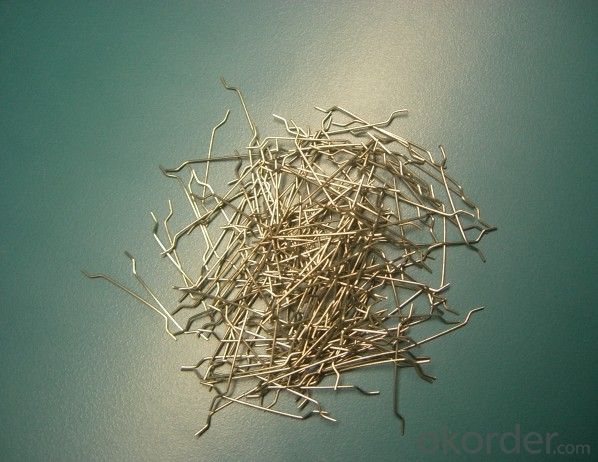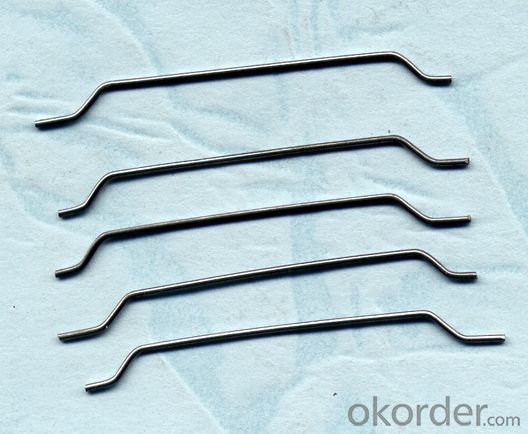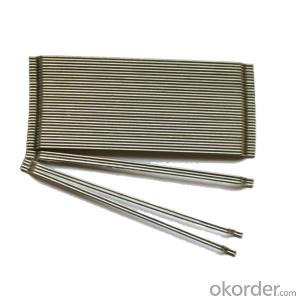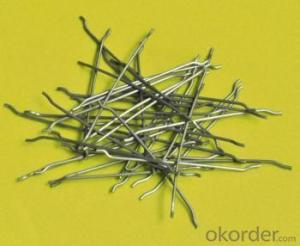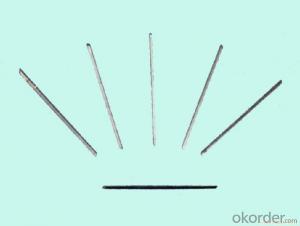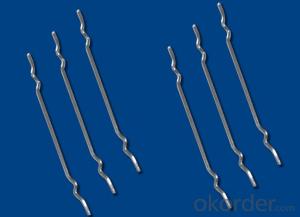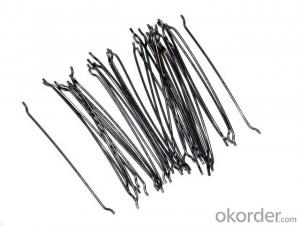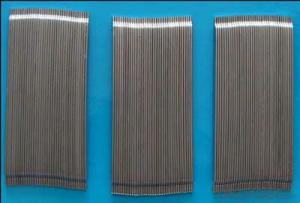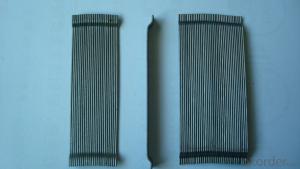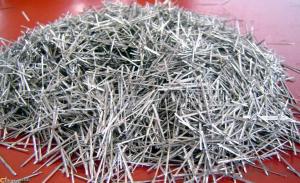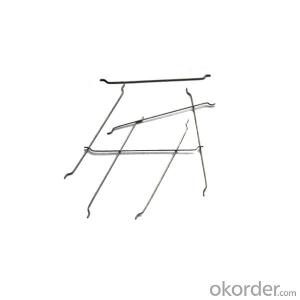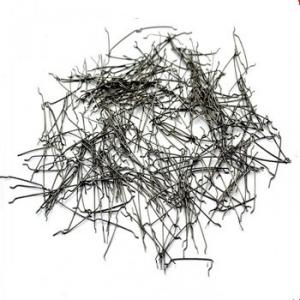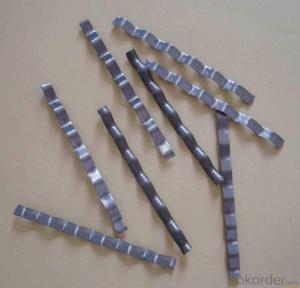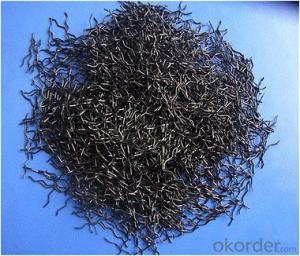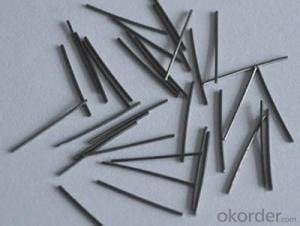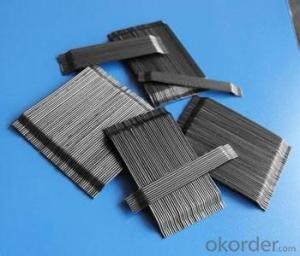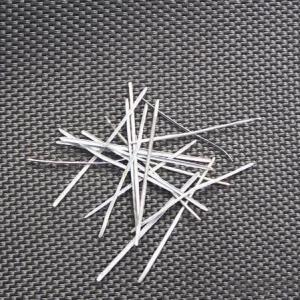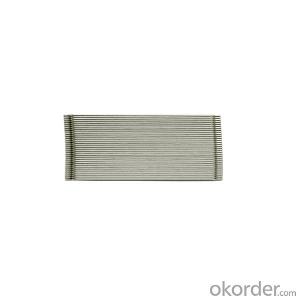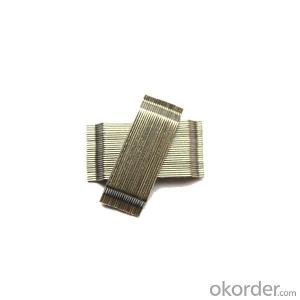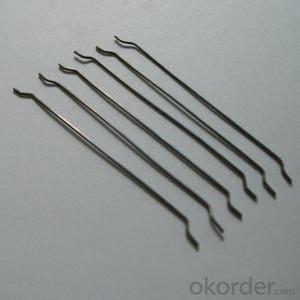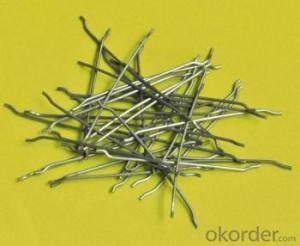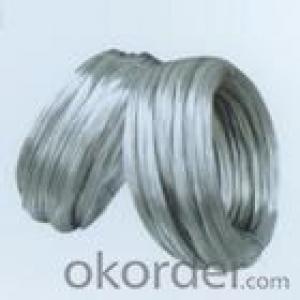Melt Extract Stainless Steel Fiber Reinforced Concrete with 1100MPA Tensile Strength
- Loading Port:
- Tianjin
- Payment Terms:
- TT OR LC
- Min Order Qty:
- 1000 kg
- Supply Capability:
- 250000 kg/month
OKorder Service Pledge
OKorder Financial Service
You Might Also Like
Quick Details
Place of Origin: Shandong, China (Mainland), Shandong, China (Mainland)
Material: Steel
material: steel wire
shape: corrugated round fiber
appearance: clean and bright
usage: construction and concrete
Model Number: steel fiber
Product features
steel iber for concrete reinforcement ,it`s widely used in buildings ,bridges ,thin roof engineering ,highway etc
cncrete steel iber is specificially designed to enhance concrete in its hardened state ,the uniform distribution of steel fibers throughout the concrete greatly improves concrete bonding and tensile strength ,additionally it provides exceptional load stability and durability ,as reliable and efficient concrete reinforcement material .
it is widely used in buildings ,bridges ,thin roof engineering ,highway etc.
Specifications
Material: round cold drawn wire
Wire diameter: 1.0mm+-0.05mm
Fiber length: 60mm
Fiber diameter: 0.75mm
Tensile strength: ≥1100Mpa
Elongation at break: < 4%
Appearance:bright and clean wire
Package and storage
20KG or 25kg/damp-proof poly and paper composite bag. 50 bags or 40 bags/pallet.
The pallets should be protected against rain and snow.
Product standard
EN14889-1type1(cold drawn wire)
SATM A820/A820M-04type1(cold drawn wire)
Features and benefits(comparing with common concrete)
Tensile Strength (%) | Against pressure (%) | Against shear (%) | against bending (%) | Against impact (%) | Against fatigue (%) | Wear resistance(%) |
50-70 | 8-10 | 50-100 | 120-180 | 200-700 | 50-60 | 25-35 |
Picture
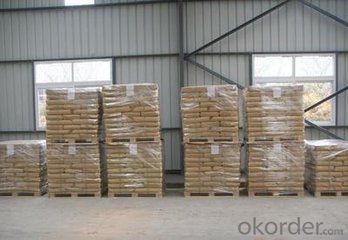
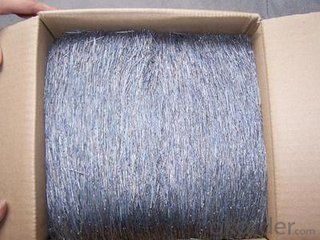
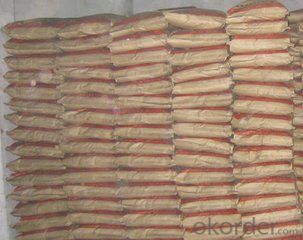
steel fiber for concrete reinforcement
FAQ
we can produce any type steel fiber and of course we can make production according to your requirement
we have specilize in this field for almost 10 years ,with good quality and competitive price
cncrete steel iber is specificially designed to enhance concrete in its hardened state ,the uniform distribution of steel fibers throughout the concrete greatly improves concrete bonding and tensile strength ,additionally it provides exceptional load stability and durability ,as reliable and efficient concrete reinforcement material .
- Q: Can melt extract stainless steel fiber improve the durability of concrete in acidic environments?
- Yes, melt extract stainless steel fiber can improve the durability of concrete in acidic environments. The stainless steel fibers enhance the concrete's resistance to corrosion and chemical attacks caused by acidic substances, thereby improving its durability in such environments.
- Q: Is melt extract stainless steel fiber compatible with different types of shotcrete curing methods?
- Different types of shotcrete curing methods can be effectively used with melt extract stainless steel fiber. This fiber type is commonly employed in shotcrete applications to enhance the strength, durability, and ductility of the concrete. It can be incorporated into the shotcrete mix and applied to various surfaces using wet or dry techniques. Melt extract stainless steel fiber offers compatibility with a range of shotcrete curing methods, including standard wet curing, accelerated curing, and polymer-based curing. Its utilization aids in the reduction of cracking and shrinkage in shotcrete, leading to improved overall performance and longevity. Moreover, melt extract stainless steel fiber displays high resistance to corrosion and can endure harsh environmental conditions. This quality renders it suitable for employment in diverse shotcrete curing methods. Its excellent bonding with the concrete matrix enhances structural integrity, impact resistance, and abrasion resistance. In conclusion, melt extract stainless steel fiber is compatible with various types of shotcrete curing methods and has the potential to significantly enhance the performance and durability of shotcrete applications.
- Q: Can melt extract stainless steel fiber be used in industrial flooring applications for shotcrete?
- Melt extract stainless steel fiber is a suitable option for shotcrete applications in industrial flooring. Shotcrete is a construction method that involves spraying concrete onto a surface using air pressure, resulting in a fast and efficient way to create a strong and durable floor. By incorporating stainless steel fiber into the shotcrete mix, the overall performance and durability of the flooring system can be enhanced. To produce melt extract stainless steel fiber, stainless steel is melted and then rapidly extracted into fine fibers. These fibers are known for their high tensile strength, resistance to corrosion, and toughness. When added to shotcrete, they contribute to improved crack resistance, impact resistance, and overall durability of the floor. In industrial environments where floors are subjected to heavy loads, impacts, and abrasion, using stainless steel fiber in shotcrete can offer significant advantages. It helps to minimize cracking, enhance resistance to wear and tear, and extend the lifespan of the floor. Moreover, stainless steel fiber can augment the fire resistance of shotcrete flooring, making it appropriate for industrial settings where fire safety is a concern. Overall, melt extract stainless steel fiber is an excellent choice for shotcrete applications in industrial flooring. It provides enhanced performance, durability, and fire resistance, making it a dependable solution for industrial settings that require robust and long-lasting flooring.
- Q: Can melt extract stainless steel fiber be used in marine structures for shotcrete?
- Yes, melt extract stainless steel fiber can be used in marine structures for shotcrete. Stainless steel fibers offer excellent corrosion resistance, making them suitable for use in marine environments. Additionally, the fibers enhance the tensile strength and crack resistance of shotcrete, improving the durability and longevity of the marine structures.
- Q: Can melt extract stainless steel fiber be used in the construction of stadium seating areas?
- Melt extract stainless steel fiber is a viable option for the construction of stadium seating areas due to its exceptional qualities. With its high strength, durability, and resistance to corrosion, stainless steel fibers are well-suited for various construction purposes. In the case of stadium seating areas, incorporating stainless steel fibers into the concrete mix enhances its mechanical properties, preventing cracks and shrinkage. This results in improved structural integrity and increased longevity, enabling the seating areas to withstand heavy loads and frequent use. Furthermore, the inclusion of stainless steel fibers enhances the fire resistance of the concrete, offering an additional safety measure during fire incidents. Consequently, melt extract stainless steel fiber is a beneficial material for constructing stadium seating areas.
- Q: What is the recommended fiber geometry for melt extract stainless steel fiber in concrete?
- The recommended fiber geometry for melt extract stainless steel fiber in concrete is typically in the form of straight, monofilament fibers. These fibers are usually slender and have a diameter ranging from 0.15 mm to 0.50 mm. The length of the fibers can vary, but it is often recommended to use fibers with lengths between 20 mm to 50 mm for optimal performance in concrete. The use of straight, monofilament fibers offers several advantages in concrete applications. Firstly, these fibers provide excellent bonding with the surrounding concrete matrix, enhancing the overall mechanical properties of the material. Secondly, the straight geometry allows for effective dispersion and distribution of the fibers throughout the concrete, ensuring uniform reinforcement and improved crack control. Additionally, the slender diameter of the fibers allows for easier mixing and placement of the concrete, without significantly affecting the workability of the mixture. It is important to note that the specific fiber geometry may vary depending on the desired performance requirements and the specific application of the concrete. Therefore, it is recommended to consult with manufacturers or experts in the field to determine the most suitable fiber geometry for a particular project.
- Q: How does melt extract stainless steel fiber enhance the resistance of concrete to corrosion?
- Melt extract stainless steel fiber enhances the resistance of concrete to corrosion through its unique properties and characteristics. When added to concrete as a reinforcement material, stainless steel fiber acts as a barrier against corrosive agents and prevents their penetration into the concrete matrix. One of the main reasons why stainless steel fiber is effective in enhancing corrosion resistance is its high corrosion resistance itself. Stainless steel is composed of iron, chromium, and other alloying elements that create a protective oxide layer on its surface. This oxide layer acts as a shield against corrosive elements such as chloride ions, which are one of the main causes of corrosion in concrete structures. As a result, the stainless steel fiber prevents the penetration of chloride ions into the concrete, reducing the risk of corrosion. Furthermore, the presence of stainless steel fiber in concrete also improves the overall durability and lifespan of the structure. Stainless steel fibers help to increase the tensile strength and flexural strength of concrete, making it less prone to cracking or spalling. By reinforcing the concrete matrix, stainless steel fiber enhances its ability to withstand external loads and environmental factors, including corrosive agents. Additionally, stainless steel fiber has a high aspect ratio, meaning it is relatively long and thin. This characteristic allows the fibers to create a three-dimensional reinforcement network within the concrete, improving its resistance to cracking and reinforcing its overall structure. This network of fibers also acts as a physical barrier that prevents the movement of corrosive elements, such as water and oxygen, within the concrete, further reducing the risk of corrosion. In conclusion, melt extract stainless steel fiber enhances the resistance of concrete to corrosion by providing a high level of corrosion resistance, improving the overall durability and lifespan of the structure, and creating a three-dimensional reinforcement network within the concrete. These properties make stainless steel fiber an effective solution for enhancing the corrosion resistance of concrete structures, ultimately increasing their longevity and reducing maintenance and repair costs.
- Q: How does melt extract stainless steel fiber improve the bond strength of shotcrete?
- Melt extract stainless steel fiber improves the bond strength of shotcrete by providing additional reinforcement and enhancing the connection between the shotcrete mix and the substrate. The fibers act as a network of reinforcement within the shotcrete, increasing its tensile strength and preventing crack propagation. This ultimately leads to a stronger bond between the shotcrete and the surface, improving the overall durability and performance of the shotcrete application.
- Q: Is melt extract stainless steel fiber suitable for use in airport runway construction?
- Melt extract stainless steel fiber is indeed a suitable option for airport runway construction. Its durability, corrosion resistance, and high tensile strength make it perfect for heavy-duty applications such as airport runways. By incorporating these fibers into the concrete, the overall strength and performance of the material are enhanced, resulting in improved resistance to cracking, impact, and fatigue. Moreover, the non-magnetic properties of stainless steel fibers are crucial for airport runways, as they ensure there is no interference with sensitive navigation systems. Hence, choosing melt extract stainless steel fiber is a dependable and fitting decision for constructing airport runways.
- Q: Does melt extract stainless steel fiber improve the fire resistance of concrete?
- Yes, melt extract stainless steel fiber does improve the fire resistance of concrete. When added to concrete, stainless steel fibers act as reinforcement, enhancing the strength and durability of the material. During a fire, these fibers help to slow down the spread of heat and prevent the concrete from cracking or spalling. Additionally, the high melting point of stainless steel ensures that it retains its structural integrity even under extreme temperatures. This improves the overall fire resistance of the concrete, making it a more reliable and safe construction material in fire-prone areas.
Send your message to us
Melt Extract Stainless Steel Fiber Reinforced Concrete with 1100MPA Tensile Strength
- Loading Port:
- Tianjin
- Payment Terms:
- TT OR LC
- Min Order Qty:
- 1000 kg
- Supply Capability:
- 250000 kg/month
OKorder Service Pledge
OKorder Financial Service
Similar products
Hot products
Hot Searches
Related keywords
